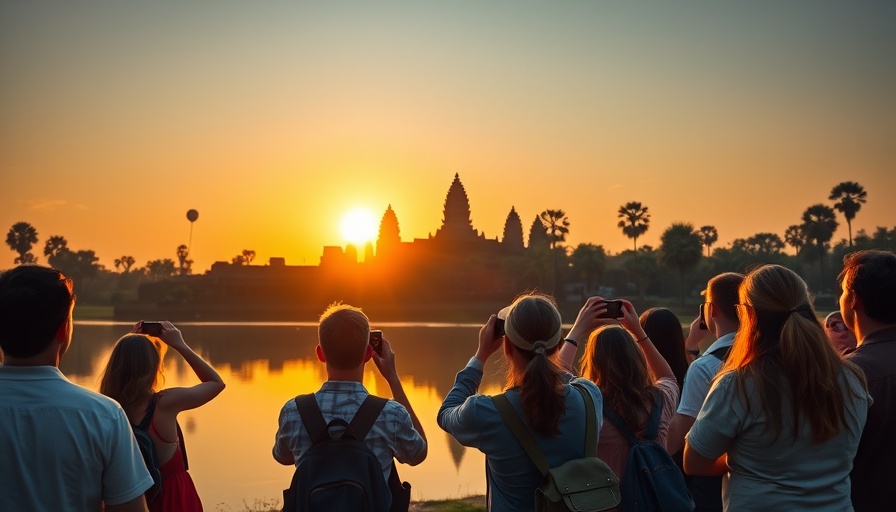
Understanding Cambodia's Tourism Landscape
Cambodia’s tourism sector achieved remarkable growth in 2024, attracting 6.7 million international visitors—a significant 8% increase compared to 2018. While this surge is impressive, there is a glaring paradox: Angkor Archaeological Park, the country's crown jewel and a UNESCO World Heritage Site, is experiencing an unsettling decline in visitors. This troubling trend highlights the need for an innovative approach to tourism in Cambodia, one that allows the country to sustain its growth while preserving the cultural and historical integrity of its most iconic sites.
The Decline of an Icon
Despite the overall recovery in tourist numbers, only 15.3% of international visitors in 2024 bought tickets for Angkor Archaeological Park—a stark contrast to 41.8% in 2018. This translates to a drop in Angkor visitors from 2.59 million in 2018 to just over 1 million in 2024. The embodiment of Cambodia's historical significance and cultural pride is fading, raising concerns among local authorities and the tourism sector about the long-term sustainability of such a vital attraction.
The China Factor: A Major Shift in Demographics
The downturn in Angkor’s visitor numbers closely correlates with a sharp decline in tourists from China. In 2018, over 1.12 million Chinese tourists visited Angkor; however, by 2024, this number plummeted by 92.6% to just 82,675. Many of the new arrivals to Cambodia come from neighboring ASEAN countries like Thailand and Vietnam, who generally prioritize more affordable shorter trips lacking interest in cultural sites, such as Angkor.
Searching for Alternatives: Emerging Markets
The potential rebound of Angkor may hinge on emerging visitor markets. For instance, tourists from India show growing interest, especially young couples seeking spiritual journeys. In contrast, a lack of direct flights reduces the numbers from Japan and South Korea, threatening the potential for recovery in these crucial markets. Meanwhile, Europeans, the dedicated few, traverse great distances, often returning after their first visit, signifying a need for new and enticing experiences even among seasoned travelers.
Insights From Neighboring Countries
As the tourism landscape shifts, comparisons with neighboring countries such as Thailand and Vietnam are essential. These nations boast rich cultural offerings, attracting a larger share of the regional tourism market. The modeling of their tourism strategies might provide valuable insights for Cambodia, demonstrating that the strength of traditional attractions must be complemented by innovative travel experiences that resonate with modern visitors looking for more than just sightseeing.
The Way Forward: Embracing Sustainability and Innovation
The decline of Angkor calls for a renewed focus on sustainable tourism that aligns economic benefits for the community with environmental protection and cultural preservation. By prioritizing responsible tourism initiatives, such as volunteer-based travel (voluntourism) and localized experiences, Cambodia can create a vibrant, engaging landscape that attracts a diverse range of visitors while honoring its heritage. Innovation in marketing and strategic partnerships with tour operators focusing on eco-tourism can help revive interest in Angkor without compromising its integrity.
Emotional Resonance: The Heart of Travel
Ultimately, what ties visitors to Cambodia is not just its stunning landscapes or ancient temples but the stories imbued within them. Harnessing the power of human-centered travel experiences will serve to enrich visitor engagement and rekindle the connection to landmark sites like Angkor. Tourists should feel an emotional bond with their destinations, understanding their historical significance while contributing to the local economy and cultural preservation.
Call to Action: Discover Now!
To help shape a vibrant future for Cambodia's tourism, consider embracing sustainable travel practices on your next adventure. Engage with local communities, seek eco-friendly accommodations, and participate in cultural experiences that celebrate Cambodia's history. Your choices can ensure that future generations continue to experience the awe of Angkor and other remarkable sites.
 Add Row
Add Row  Add
Add 




Write A Comment